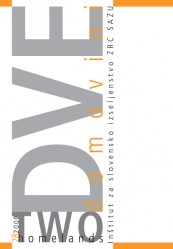Internet kot medij ohranjanja narodne in kulturne dediščine med Slovenci po svetu. Stare dileme novih rešitev.
Ključne besede:
Internet, virtualne etnične skupine, slovenski izseljenci in njihovi potomci, narodna in kulturna dediščina, komunikacijaPovzetek
Avtorja skušata s pomočjo različnih teoretskih pretpostavk in terena raziskati komunikacijo ter narodno in kulturno dediščino Slovencev v svetu na internetu. Gre za hitro razvijajočo se tehnologijo, kjer se dogajajo številne spremembe, ki vplivajo na uporabnike. Tako je v zadnjem času relativno statično, enosmerno komunikacijo »klasičnih« spletnih strani nadomestila precej bolj interaktivna na forumih, straneh za nasnemavanje videoposnetkov, blogih in nadgradnjah spletnih strani. A tu je čedalje težje najti kriterije za vrednotenje gradiva, oz. za določanje, kaj v teh primerih narodna in kulturna dediščina sploh je. Gradivo tako postane kar celotna debata, komunikacija določenih skupin, ki razpravljajo o različnih vrednotah, mitih, stereotipih, kulturnih praksah, identitetah in svoja virtualna srečanja prenašajo tudi v fizični svet.
Prenosi
Literatura
Ang, Ien (1991). Desperately seeking the audience. London; New York: Routledge.
Anderson, Benedict (1998). Zamišljene skupnosti: o izvoru in širjenju nacionalizma. Ljubljana: SH.
Appadurai, Arjun (1990). Disjuncture and difference in the global cultural economy, v: Global culture: nationalism, globalisation, modernity (ur. M. Featherstone). London: Sage.
Appadurai, Arjun (2001). Globalization. Durham, NC; London: Duke University Press.
Bauman, Zigmund (2002). Tekoča moderna. Ljubljana: Založba /cf*.
Bhaba, Homi (1994). The Location of Culture. London, New York: Routledge.
Boden, Deirdre in Molotch, Harvey L. (1994).The compulsion of proximity, v: NowHere Space, Time and Modernity (ur. R. Friedland in D. Boden). London, UK: University of California Press.
Castells, Manuel (2001). The Internet galaxy: reflections on the Internet, business, and society. New York; Oxford: Oxford University Press.
Casey, Edward S. (1998). Giving a face to place in the present, v: The fate of place, Berkeley, California: University of California Press.
Cikić, Sanja (2002). Povezovanje Slovencev po svetu s pomočjo Interneta: Vzpostavljanje virtualnih etničnih skupnosti. Dve Domovini/Two Homelands, 16: 81–98.
Čavič, Uroš (2008) Nekaj zelo kratkih misli o Facebooku in Myspaceu, http://www.dsolutions.si/about_si.htm (5. 9. 2008).
Dufoix, Stephane (2008). Diasporas. Berkeley, California: University of California Press.
Elkins, David J. (1997). Globalization, telecommunication and virtual ethnic communities. International Political Science Review, 18, 2: 139–152.
Elkins, David J. (1999). Think locally, act globally: reflections on virtual neighbourhoods. Javnost/The Public, 6, 1: 37–54.
Fraser, Nancy (2005). Transnationalizing the public sphere. http://www.republicart.net/ disc/publicum/fraser01_en.pdf, (1. 4. 2008).
Galloway, Aleksander R. (2004) Protocol. Cambridge Massachusetts: The MIT Press.
Giddens, Anthony (1990). The consequences of modernity. Stanford, Calif.: Stanford University Press.
Giddens, Anthony (1991). Modernity and Self–Identity: Self and Society in the Late Modern Age. Stanford, California: Stanford University Press.
Hall, Stuart (1993) Cultural Identity and Diaspora. Colonial Discourse & Postcolonial Theory: A Reader. (ur. Williams, Patrick & Laura Chrisman). New York: Harvester Whaeatsheaf, 222–237.
Hall, Stuart (1997). Introduction. Representation: Cultural Representations and Signifying Practices (ur. Stuart Hall). London, Thousand Oaks, New Delhi: Sage, 1–13.
Hannerz, Ulf (1996). Transnational connections: culture, people, places. New York: Routledge.
Hannerz, Ulf (2003). Being there… and there… and there!: reflections on multi–site ethnography. Ethnography, 4, 2, 201–216.
Lefebvre, Henri (1991). The production of space. Oxford, UK; Cambridge, Mass., USA: Blackwell.
Laguerre, Michel (2002). Virual Diasporas: A New Frontier of National Security, http:// www.nautilus.org/gps/virtual-diasporas/paper/Laguerre.html (20. 8. 2008).
Meden, Ahac (2007). Spletne strani Slovencev po svetu. Dve Domovini/Two Homelands, no. 26: 47–73.
Mitchell, William J. (1995). City of bits: space, place, and the Infobahn. Cambridge, Mass.: MIT Press.
Mikola, Maša (2005). Živeti med kulturami. Ljubljana: Založba ZRC SAZU, Zbirka Migracije.
Miller, Daniel in Slater, Don (2000). The Internet: an etnographic approach. Oxford, New York: Berg.
Mlekuž, Jernej (2008). Burek.si?! Ljubljana: Studia Humanitatis, Zbirka Varia.
Noelle Ignacio, Emily (2005) Building Diaspora. New Brunswick, New Jersey, London: Rutgers University Press.
Okence v Slovenijo, http://www.datamarkets.com.ar/Okenceslo/ (31. 8. 2008).
Rheingold, Howard (1994). The virtual community: homesteading on the electronic frontier. New York, NY: HarperPerennial.
Shohat, Ella (1999). By the Bitrstream of Babylon: Cyberfrontiers and Diasporic Vistas. Home, Exile, Homeland: Film, Media, and the Politics of place (ur. Hamid Nacify). New York, London: Rutlege, 233–237.
Thezaurus: Slovenian language and cultural resources, http://www.thezaurus.com, (1. 4. 2008).
Triglav-Stuttgard, http://www.triglav-stuttgart.si/forum/, (3. 8. 2008).
Triglav-return, http://www.youtube.com/watch? v=CdKeuF4T8WM (1. 9. 2008).
You Know, http://www.facebook.com/group.php?gid=2225152464 (2. 9. 2008).
Urry, John (2000). Sociology beyond societies: mobilities for the twenty-first century. London: Routledge.
WELL, Whole World 'Lectronic Link. http://www.well.com/ (4. 2008).
Žitnik Serafin, Janja (2008). Statistical facts are human fates: unequal citizens in Slovenia. Journal of ethnic and migration studies, 34, 1: 77–94.
Prenosi
Objavljeno
Kako citirati
Številka
Rubrike
Licenca

To delo je licencirano pod Creative Commons Priznanje avtorstva-Nekomercialno-Brez predelav 4.0 mednarodno licenco.
Avtorji jamčijo, da je delo njihova avtorska stvaritev, da v njem niso kršene avtorske pravice tretjih oseb ali kake druge pravice. V primeru zahtevkov tretjih oseb se avtorji zavezujejo, da bodo varovali interese založnika ter da bodo povrnili morebitno škodo.
Podrobneje v rubriki: Prispevki





